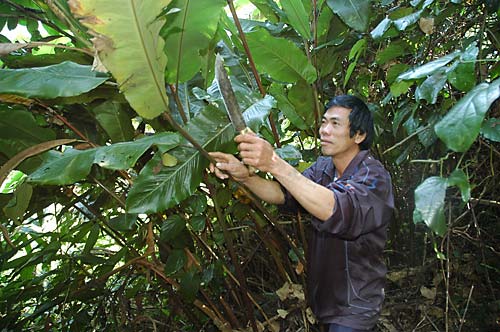South-East Asia nations discuss integration of plant conservation targets into national policies
Singapore, 8th April 2013—Participants from countries across South-East Asia plus China met last month in Singapore to develop or update national and regional plant conservation targets consistent with the Global Strategy for Plant Conservation (GSPC).

The GSPC was adopted by parties to the Convention on Biological Diversity (CBD) in April 2002 and for the first time set quantitative, although non-binding, conservation targets and a deadline for their attainment.
The GSPC currently has 16 targets under five objectives that include sustainable and equitable use of plant products, documentation and conservation of plant diversity improving education and awareness of plants, and increasing capacity for plant conservation.
The Regional Workshop on Reflecting in National Biodiversity Strategies and Action Plans (NBSAPs) workshop in Singapore last monthwas organized by the CBD Secretariat in collaboration with Botanic Gardens Conservation International and Singapore Botanical Gardens.
Over 30 delegates, mostly national GSPC focal points, took part, including participants from Cambodia, China, Indonesia, Lao PDR, Malaysia, Myanmar, Philippines, Singapore, Thailand, Timor Leste and Viet Nam.
The experiences of the participating countries varied, from minimal to significant progress in developing national strategies and implementation. For example, Timor Leste has not started development of their national plant conservation strategy, but was attending to learn more about the process, while Malaysia has made significant progress, especially in an inventory of national plant species.
TRAFFIC, as a member of the Global Partnership for Plant Conservation, provided specific contributions on delivery of GSPC Objective 3—Plant diversity is used in a sustainable and equitable manner—and presented information on best practice tools that can be of relevance to policy makers in the region when developing and implementing sustainable use strategies for plants.
Chen Hin Keong, TRAFFIC’s Timber Trade Programme Leader, spoke about TRAFFIC’s work on the medicinal and aromatics plant trade, the timber legality framework for monitoring and evaluating the trade in medicinal plants and timber species, and the Fairwild Standard. The FairWild Standard is included in the GSPC implementation toolkit as the best practice for the delivery on Target 12—All wild harvested plant-based products are sourced sustainably.
Within South-East Asia, TRAFFIC has previously piloted the FairWild Standard in a community-based resource management in Cambodia and is currently implementing a FairWild project, supported by the Critical Ecosystem Partnership Fund (CEPF), in Viet Nam.
Chen Hin Keong said: “We trust that TRAFFIC’s contribution to this important workshop will stimulate the use of best-practice tools such as the FairWild Standard and provide a structure for countries to manage their plant resources sustainably and at the same time gain economic and livelihood benefits for local communities.”



